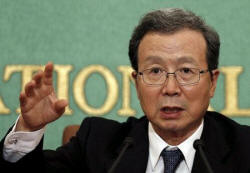|
 China
envoy warns Japan not to backtrack on expressions of WW2 remorse China
envoy warns Japan not to backtrack on expressions of WW2 remorse
 Send a link to a friend
Send a link to a friend
[July 23, 2015]
By Elaine Lies
TOKYO (Reuters) - Japanese Prime Minister
Shinzo Abe needs to clearly express remorse for his nation's World War
Two actions or risk "rubbing salt in the wounds" of those who suffered,
China's ambassador to Japan said on Thursday.
|
|
 Ties between the Asian neighbors have long been fraught due to
China's memories of Japan's wartime aggression, but relations
improved following meetings between Abe and Chinese President Xi
Jinping over the last year. Japanese government sources say another
summit could well take place this year. Ties between the Asian neighbors have long been fraught due to
China's memories of Japan's wartime aggression, but relations
improved following meetings between Abe and Chinese President Xi
Jinping over the last year. Japanese government sources say another
summit could well take place this year.
But some also say China first wants to see a planned statement by
Abe marking the 70th anniversary of the war's end, amid concerns he
may dilute past government apologies.
Cheng Yonghua, China's ambassador to Japan, warned Japan not to
backtrack on previous government statements and said China was
keenly waiting, particularly to see if he expressed remorse toward
those who suffered from Japan's actions.
 "If the statement is deliberately made vague, or if it lightens
responsibility, it will once again rip open the wounds of China and
the other victims, and rub salt in them," Cheng told a news
conference in Tokyo.
In landmark 1995 comments known as the Murayama Statement, Prime
Minister Tomiichi Murayama made a "heartfelt apology" for the
wartime damage and suffering caused by Japan.
[to top of second column] |

Abe has repeatedly said that he will express remorse in the
statement, expected out shortly before the Aug. 15 anniversary of
the war's end, but that he will not issue a fresh apology - despite
a recent poll by Kyodo news agency that found 67 percent of
respondents thought he should.
(Reporting by Elaine Lies; Editing by Jeremy Laurence)
[© 2015 Thomson Reuters. All rights
reserved.]
Copyright 2015 Reuters. All rights reserved. This material may not be published,
broadcast, rewritten or redistributed.
 |